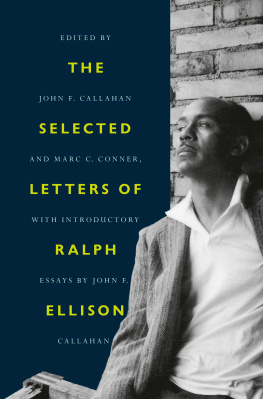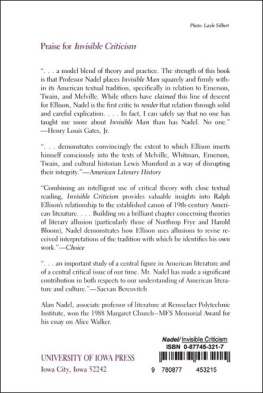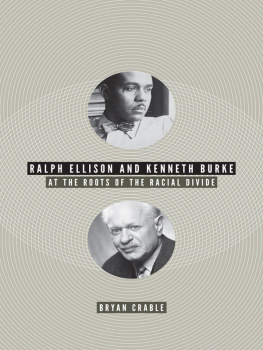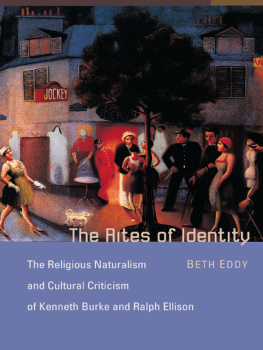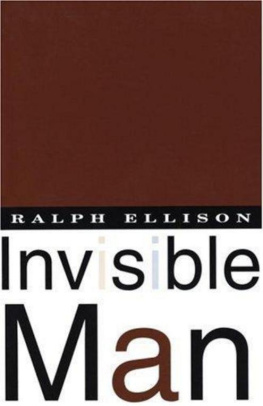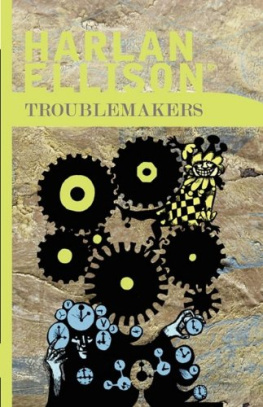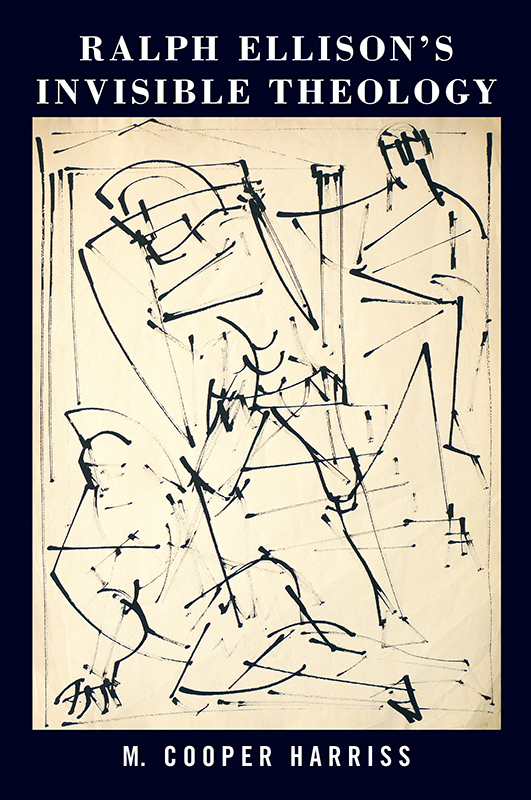
Ralph Ellisons Invisible Theology
North American Religions
Series Editors: Tracy Fessenden (Religious Studies, Arizona State University), Laura Levitt (Religious Studies, Temple University), and David Harrington Watt (History, Temple University)
In recent years a cadre of industrious, imaginative, and theoretically sophisticated scholars of religion have focused their attention on North America. As a result the field is far more subtle, expansive, and interdisciplinary than it was just two decades ago. The North American Religions series builds on this transformative momentum. Books in the series move among the discourses of ethnography, cultural analysis, and historical study to shed new light on a wide range of religious experiences, practices, and institutions. They explore topics such as lived religion, popular religious movements, religion and social power, religion and cultural reproduction, and the relationship between secular and religious institutions and practices. The series focus primarily, but not exclusively, on religion in the United States in the twentieth and twenty-first centuries.
Books in the series:
A VA C HAMBERLAIN, The Notorious Elizabeth Tuttle: Marriage, Murder, and Madness in the Family of Jonathan Edwards
T ERRY R EY AND A LEX S TEPICK, Crossing the Water and Keeping the Faith: Haitian Religion in Miami
J ODI E ICHLER- L EVINE, Suffer the Little Children: Uses of the Past in Jewish and African American Childrens Literature
I SAAC W EINER, Religion Out Loud: Religious Sound, Public Space, and American Pluralism
H ILLARY K AELL, Walking Where Jesus Walked: American Christians and Holy Land Pilgrimage
B RETT H ENDRICKSON, Border Medicine: A Transcultural History of Mexican American Curanderismo
A NNIE B LAZER, Playing for God: Evangelical Women and the Unintended Consequences of Sports Ministry
E LIZABETH P REZ, Religion in the Kitchen: Cooking, Talking, and the Making of Black Atlantic Traditions
K ERRY M ITCHELL, Spirituality and the State: Managing Nature and Experience in Americas National Parks
F INBARR C URTIS, The Economy of American Religious Freedom
M . C OOPER H ARRISS, Ralph Ellisons Invisible Theology
Ralph Ellisons Invisible Theology
M. Cooper Harriss

NEW YORK UNIVERSITY PRESS
New York
NEW YORK UNIVERSITY PRESS
New York
www.nyupress.org
2017 by New York University
All rights reserved
Cover art Romare Bearden Foundation/Licensed by VAGA, New York, NY
(What Did I Do To Be So) Black And Blue, words by Andy Razaf, music by Harry Brooks and Fats Waller. Copyright (c) 1929 by Chappell & Co., EMI Mills Music Inc. and Razaf Music. Copyright renewed. All rights for Razaf Music administered by BMG Rights Management (US), LLC. All rights reserved. Used by permission; reprinted by permission of Hal Leonard Corporation.
Portions of the Introduction and Conclusion were previously published in Race and Secularism in America, edited by Jonathon S. Kahn and Vincent Lloyd. Copyright (c) 2016 Columbia University Press. Reprinted with the permission of the publisher.
References to Internet websites (URLs) were accurate at the time of writing. Neither the author nor New York University Press is responsible for URLs that may have expired or changed since the manuscript was prepared.
ISBN : 978-1-4798-2301-7
For Library of Congress Cataloging-in-Publication data, please contact the Library of Congress.
New York University Press books are printed on acid-free paper, and their binding materials are chosen for strength and durability. We strive to use environmentally responsible suppliers and materials to the greatest extent possible in publishing our books.
Manufactured in the United States of America
10 9 8 7 6 5 4 3 2 1
Also available as an ebook
For Sarah
Contents
I have grappled with Ellison for exactly two decades, profiting during that time from the tutelage of extraordinary teachers. From a first reading of Invisible Man with Heather Ross Miller and a formative independent study on Ellison and Albert Murray with Marc Conner at W&L to Robert Steptos Ellison in Context seminar at Yale, I have come by this obsession honestly and remain grateful for the passion they wrought. It was not until I began doctoral work in the Religion and Literature program at the University of Chicago Divinity School, however, that I found an appropriate organizing principle for shaping this enthusiasm and cultivating the pursuit of those things not seen through prior lenses. Rick Rosengarten, who both provided my first forays into R&L-proper (insofar as such a thing might be supposed to exist) and would later direct the research from which this volume has evolved, proved deft as an advisor and counselor as the project took shape and remains a friendly sage in the interimone who often knows what I mean better than I, myself, can discern or say. The late Anthony C. Yu, who provided institutional context and first informed me of Ellisons relationship with Nathan Scott, remains a presence of learnedness, rigor, and cultivation whenever I read, write, and rewrite. Clark Gilpins clarity in blending history, religious thought, and the close reading of texts inspired me to recognize new possibilities for thinking about an author whose critical legacy had become stagnant. Kenneth Warren, whose critical courage I ardently admire, proved open to and encouraging of this project, providing needed cross-disciplinary insight. I am also grateful to Gilbert Bond, Catherine Brekus, Jacqueline Goldsby, Dwight Hopkins, Kathryn Kerby-Fulton, Guy Martin, Carolyn Sharp, and Kathryn Tannerteachers who have, at times and over time, encouraged and contributed to my religious and literary pursuits both in coursework and consultation.
Ralph Ellisons Invisible Theology has remained in progress for many years and under a couple of guises, providing ample opportunities for presentation and feedback in various public fora. Special thanks go to audiences at the University of Chicago, Northwestern, Millsaps, the University of Minnesota, Syracuse, Manhattan College, the University of Pittsburgh, New York University, Virginia Tech, Indiana University, Notre Dame, CUNY Graduate Center, the American Academy of Religion, the Southern Humanities Council, and the American Literature Association for the opportunity to audition no small amount of the material contained in this book and for helpful feedback, challenges, and encouragement along the way. Along similar lines, a number of people have read drafts, listened to half-cocked ideas, supplied key points of information and suggested reading, and provided more insight than they can imagine. Special thanks go to Ed Blum, Jay Carter, Marc Conner, Spencer Dew, Marcus Harvey, Paul Harvey, John Howell, Jonathon Kahn, Pippa Koch, Mark Ledbetter, Vincent Lloyd, Caleb J. D. Maskell, Kristen Tobey, and several anonymous readers. My colleagues at Indiana, Pitt, and Virginia Tech have also shared their expertise and support. I remain grateful to them all, but would especially like to acknowledge Ananda Abeysekara, Brian Britt, Constance Furey, Matt Gabriele, Sarah Imhoff, Paula Kane, Elizabeth Struthers Malbon, Zhange Ni, Ben Sax, Jeremy Schott, Adam Shear, Winni Sullivan, and Michael Tillitson. Significant work on Ralph Ellisons Invisible Theology was completed with the financial support and time afforded by a postdoctoral fellowship in the Kenneth P. Dietrich School of Arts and Sciences at the University of Pittsburgh.
Next page

